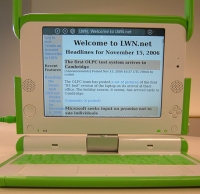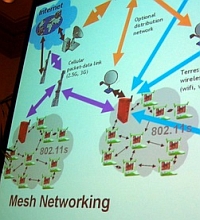The OLPC Wiki is an interesting experiment in collaborative expression. And also sometimes confusing as to what One Laptop Per Child's actions really are. Someone reading the School Gateways section of the OLPC Hardware page may get the wrong impression about One Laptop Per Child's commitment to Internet connectivity:
The OLPC networking concept is not Internet-based. We assume that there will be no Internet connectivity and no Internet gateways. The laptops are being deployed into countries which do not have a lot of native-language content available on the Internet.That sounds quite official, like the OLPC Children's Machine XO will not be Internet-enabled and therefore limited in their global connectivity. But then you read what Nicholas Negroponte says in Kevin Allison's "Clever kit to benefit the poor" Financial Times article and you get a whole other impression:The networking focus is to make sure that the laptops will be able to communicate with each other over a larger than normal area, and that they will be able to communicate with resources in the school. In most cases, these school resources will not be Internet gateways but will be more like a cross between a library and an FTP site with content that kids can download to their laptops.
Of course some schools will have Internet access and may copy Internet content for use by the kids, but the laptops are not intended to be used for direct Internet surfing.
"If you do the maths, this takes about 600 people to [install]1m machines over 12 months," Mr Negroponte says. "This includes an advance team, school by school, to install internet access, typically via satellite. That point of access can serve as many as 1,000 kids."Add Negroponte's comments to the earlier announcement of a SES Global satellite bandwidth donation and you would be right to think that One Laptop Per Child is very interested in connecting laptops to Internets.
But OLPC also understands that there will be as many different implementation configurations are there are countries or even schools. According to James Turner's Linux Today article about Michail Bletsas's speech at CES:
[T]here are so many peculiarities to each countries information infrastructure, that [Internet connectivity] really needs to be handled on a country by country basis. Among the connectivity solutions that are being suggested are satellite, WiMax, and cellular.Connectivity for thousands of students who, with the right networking rules and bandwidth sharing, could be Internet surfing on just about any type of link. Just don't expect international 1-to-1 video conferencing per child.
High-bandwidth applications, like video conferencing or voice over internet would be a local mesh only activity in the vast majority of installations. Not that a million others in your mesh would leave you lonely. Especially not when your OLPC XO has a kilometer mesh network range!




Indeed, BitFrost, the OLPC security platform, also seems to be expecting Internet connectivity: To deter laptop theft, in certain countries any laptop not connected to the Internet within X days (where 21 was a ballpark in the spec iirc) would lose all functionality until 'restarted' from a controlled USB key. Any laptop that was reported stolen will be discoverable once it connected to the Internet (by announcing itself with its unique ID).
My interest in the olpc xo is domestic and educational. Providing them to inner city youth within certain guidelines (e.g., economic criteria and connection to school resources) would prove worthwhile on many levels. In 1984 I set up the first local AutoCAD skills training center available to unemployed area youth. Many CAD trainees were subsequently placed in unsubsidized employment. I need to test related concepts (online training?) locally...any suggestions?
OLPC could ultimately prove a major help in our clumsy "WAR ON TERROR" in that young and idle minds need an outlet beyond fanatical religious teachings. Until this challenge is solved for young inquisitive minds (something beyond a Mulla's teachings) I fear endless frustration for the west. Congratulations to Prof. Negroponte on his effort. I wonder if he already shares these views and what can be done to promote same ?
What is Negroponte talking about? How is he going ot wire these countries? No internet outside of Lagos in my country. he is a fool.